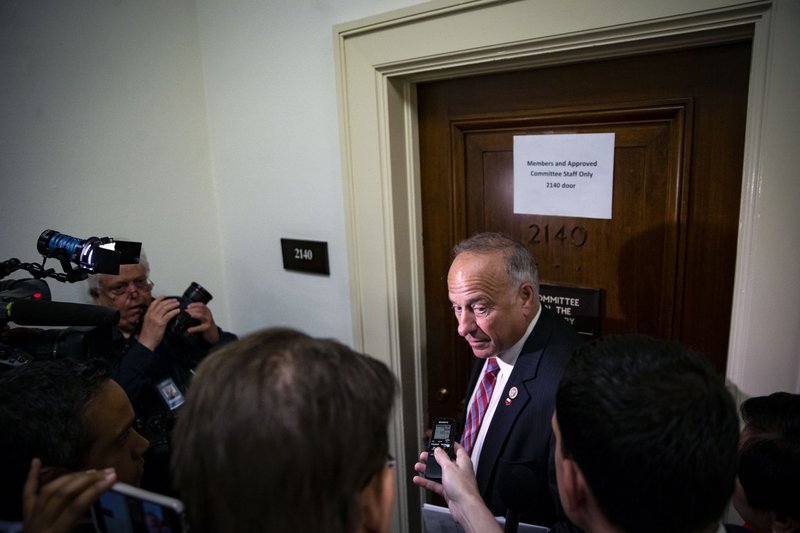WASHINGTON -- House Democratic leaders on Wednesday blocked an effort to censure Rep. Steve King for his racial comments, referring the measure to the House Ethics Committee for further review because of concerns that it might set a dangerous precedent for policing members' speech.
Censure is the most serious sanction for a House member short of expulsion, and it has been imposed six times in the past 100 years. Prompted by King's recent comments to The New York Times questioning the offensiveness of the terms "white nationalism" and "white supremacy," the House adopted a resolution condemning that hatred Tuesday.
But Rep. Bobby Rush, D-Ill., sought to go further, pressing for a vote on censuring King. After the House clerk read the resolution detailing King's inflammatory comments over the years, House Majority Leader Steny Hoyer, D-Md., moved to refer the matter to the Ethics Committee -- a step that could bottle up the effort indefinitely.
The House agreed on a voice vote.
A separate censure resolution introduced by Rep. Tim Ryan, D-Ohio, was co-sponsored by GOP members David Joyce of Ohio and Elise Stefanik of New York. Ryan's measure was also referred to the panel.
Speaking earlier Wednesday, House Majority Whip James Clyburn, D-S.C., who introduced the disapproval measure that passed Tuesday, noted that King made his statements to the news media, not during House proceedings.
"I don't know that it's a good thing for us to talk about censure for things that are done outside of the business of the House of Representatives," said Clyburn, the highest-ranking black congressional leader. "We should be very, very careful about doing anything that constrains, or seems to constrain, speech."
By doing so, you "open the window for anybody to attack speech, no matter if it's Democrats or Republicans," he added in a subsequent interview.
Hoyer told reporters Tuesday that he was concerned that censuring King might touch off a partisan tit for tat, but he also left open the possibility that he would vote for such a measure. Clyburn, too, said he would probably vote for a censure based on his personal views while opposing a vote based on his perspective as a House leader.
Besides the disapproval resolution passed Tuesday, King has suffered the loss of his committee assignments, including senior posts on the Agriculture and Judiciary panels, after Republican leaders voted Monday not to seat him. He also faces a 2020 primary challenge from a prominent state senator in his district, and several Iowa newspaper editorials have called on him to resign, including the Sioux City Journal and the Des Moines Register.
Both papers cited a 29-word remark by King published in The New York Times last week.
"White nationalist, white supremacist, Western civilization -- how did that language become offensive?" King said to the Times.
In the past, both Iowa newspapers have criticized King, with the Journal denouncing his "inflammatory or questionable comments." Both endorsed his opponent in the general election, Democrat J.D. Scholten. But with King's influence cauterized, the newspapers say he is not simply controversial, but also ineffective.
"Whatever measure of influence or effectiveness King possessed in the House is, in our view, gone," the Sioux City Journal's editorial board wrote, noting that King's recent re-election win -- before he was stripped of committee assignments -- was the narrowest of his career. "He is today, it appears to us, largely an outcast within the body in which he serves."
The Des Moines Register, Iowa's largest newspaper, said King had made the state a "laughingstock on the national stage" with his incendiary statements.
King said his comments to the Times were taken out of context. But he has not denied saying those words.
He was defiant in an interview with a conservative talk radio host Tuesday night, criticizing the Republican leaders who moved to sanction him and declaring that he would not resign.
Conservative commentators and a handful of GOP lawmakers have pointed to Democratic utterances that they think are worthy of opprobrium similar to that directed at King. Some have pointed at the recorded comments of freshman Rep. Rashida Tlaib of Michigan about President Donald Trump, pledging during a private event this month to "impeach the m * * * * * f * * * * * ."
Since the modern House Ethics committee was formed in 1967, five lawmakers have been censured -- each of them after extensive investigations by that panel. None of those instances involved a matter of offensive speech but instead dealt with various forms of official misconduct, ranging from financial misdeeds to sexual affairs with House pages.
Information for this article was contributed by Cleve R. Wootson Jr. of The Washington Post.
A Section on 01/17/2019

